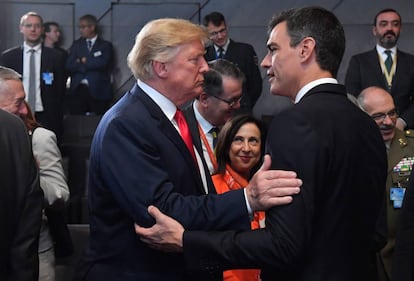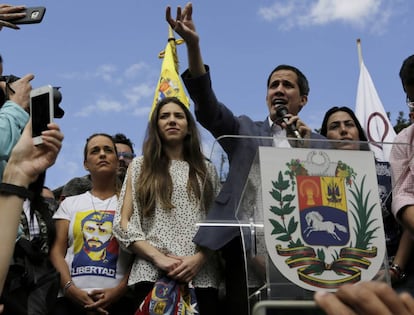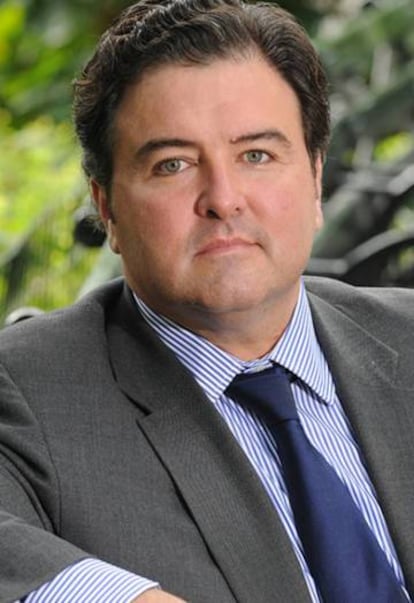Trump put pressure on Spain to break ties with Venezuela’s Maduro
US Embassy in Madrid notified Spanish government before Juan Guaidó declared himself interim president

The US administration contacted the Spanish government right before Juan Guaidó, the speaker of Venezuela’s National Assembly, declared himself the interim president of the latter country. And afterwards, it pressured for Spain and the rest of the European Union to recognize Guaidó and break all dialogue with President Nicolás Maduro.
“We are under a lot of pressure – I won’t tell you from whom but you can figure it out – to vote against the creation of this group,” said Foreign Minister José Borrell, alluding to an EU-sponsored international contact group meant to foster dialogue in Venezuela.
We are under a lot of pressure, I won’t tell you from whom but you can figure it out
Foreign Minister Josep Borrell
On January 22, Spain’s secretary of state for Cooperation and Ibero-America, Juan Pablo de Laiglesia, was in Washington DC to meet with the assistant secretary for Western Hemisphere Affairs, Kimberly Breier, and with heads of the National Security Council.
One of the subjects on the agenda was the situation in Venezuela, where Nicolás Maduro had begun his second term in office on January 10, on the strength of elections whose transparency had been questioned by the EU. The US officials at the table told the Spanish diplomat that “important events” were about to take place in Venezuela, although they declined to provide any details.
Things got more specific in the early afternoon of January 23, when a call was placed from the US embassy in Madrid: “It is likely that Guaidó will declare himself president today, and we are going to recognize him.”

In an article published that same day in The Wall Street Journal, US Vice-President Mike Pence showed support for Guaidó, with whom he had met the previous week.
Just a few hours after the phone call, Juan Guaidó stood before hundreds of thousands of people in Caracas and took an oath as the interim president of Venezuela. Less than fifteen minutes later, Donald Trump officially recognized him. He was soon followed by Latin American members of the Rio Group, all of whom have been vocal opponents of Maduro with the sole exception of Mexico.
The news caught the Spanish foreign minister at a Madrid meeting with his Portuguese counterpart, Augusto Santos Silva. Both had been discussing the launch of the international contact group that the EU agreed to in October but had yet to be implemented. The idea was for several European and Latin American countries to work as facilitators, rather than mediators, to help restore broken communication channels between the Maduro regime and the opposition.
It’s not enough for us that the US has recognized Guaidó
Augusto Santos Silva, foreign minister of Portugal
The diplomatic chiefs of the two EU countries with the biggest stake in Venezuela (nearly half of the one million Europeans who reside there are either Spanish or Portuguese), reacted cautiously to the news.
“We are not going to follow in anyone’s footsteps,” said Borrell. “It’s not enough for us that the US has recognized [Guaidó],” added Santos. Both ministers underscored the need to present a united European position.
Borrell walked out of a panel debate at Madrid’s Casa de América to take a call from the US embassy in Madrid. Ambassador Duke Buchan III wanted to see him, and also to speak to Prime Minister Pedro Sánchez at the World Economic Forum in Davos, Switzerland.

Initially, the situation analysis made by the Foreign Ministry was different to the one from La Moncloa, the seat of the Spanish executive. Government sources admit that PM Sánchez did not want to be left out of a wave of support for Guaidó that most Latin American countries had already joined, and which the opposition in Spain was using to undermine him. The statements made by French President Emmanuel Macron supporting the Venezuelan opposition stood in stark contrast with Sánchez’s silence.
Meanwhile, the Foreign Ministry was pondering the unpredictable consequences of taking such an unprecedented step. It was not just about the legal issues that came up regarding Guaidó’s self-declared presidency, but also about breaking with traditional doctrine that says that diplomatic recognition is reserved for new states, not for new governments.
But for the first time, this was about recognizing a president who does not control the state apparatus, and breaking with the individual who holds de facto power, even if it is in a legally questionable way.
On January 24, Borrell met with US Ambassador Duke Buchan III, who conveyed to him that Washington sees an important role for Spain and Portugal in the Venezuela crisis because of their ability to shape the position of the rest of the EU on this matter, according to several sources familiar with the conversation.
The US diplomat made two demands: for Spain to immediately recognize Guaidó as the legitimate president, and to cut off all dialogue with Maduro. “The United States is convinced that there is no more room for mediation or facilitation or conversation or anything, and they let us know about it,” admitted Minister Borrell during a congressional appearance on Wednesday.
We are very familiar with Washington’s strategy. What we don’t know is its road map for the day after
Spanish diplomat
On January 25, following the Spanish Cabinet meeting, Borrell announced that Spain would recognize Guaidó if Maduro failed to call new elections under international oversight “within a reasonably short space of time,” although he did not specify how long that period should be.
At that point, the creation of the EU-sponsored contact group appeared to take a back seat. “We have pushed this idea forward for the last few months [...]. It was about to be formalized [...], but events have changed the circumstances, and we are adapting our actions,” said Borrell.
On January 26, Sánchez talked in public about the Venezuelan crisis for the first time. After meeting in Davos with the presidents of Colombia, Ecuador and Costa Rica – all of whom had already recognized Guaidó – Sánchez had a telephone conversation with the National Assembly leader, then announced that he was giving Maduro eight days to call new elections.
Speaking in Bucharest on Thursday, Borrell confirmed that Spain will recognize Guaidó on Monday. Meanwhile, the EU has finally green-lighted the international contact group, but its goal will be limited (fostering new elections in Venezuela) and its existence restricted to 90 days. “Even though some of the most powerful actors in this problem are telling me that the time has come and gone for mediation, we believe it could be useful,” said Borrell.
“We are very familiar with Washington’s strategy,” said Spanish diplomatic sources. “What we don’t know is its road map for the day after, or whether it has a Plan B.”
English version by Susana Urra.
Tu suscripción se está usando en otro dispositivo
¿Quieres añadir otro usuario a tu suscripción?
Si continúas leyendo en este dispositivo, no se podrá leer en el otro.
FlechaTu suscripción se está usando en otro dispositivo y solo puedes acceder a EL PAÍS desde un dispositivo a la vez.
Si quieres compartir tu cuenta, cambia tu suscripción a la modalidad Premium, así podrás añadir otro usuario. Cada uno accederá con su propia cuenta de email, lo que os permitirá personalizar vuestra experiencia en EL PAÍS.
¿Tienes una suscripción de empresa? Accede aquí para contratar más cuentas.
En el caso de no saber quién está usando tu cuenta, te recomendamos cambiar tu contraseña aquí.
Si decides continuar compartiendo tu cuenta, este mensaje se mostrará en tu dispositivo y en el de la otra persona que está usando tu cuenta de forma indefinida, afectando a tu experiencia de lectura. Puedes consultar aquí los términos y condiciones de la suscripción digital.









































